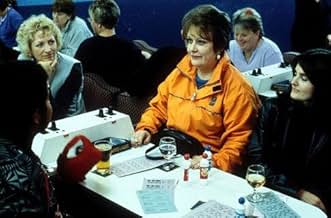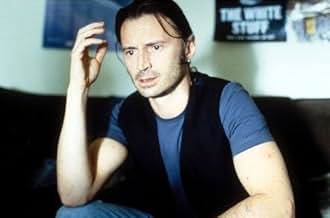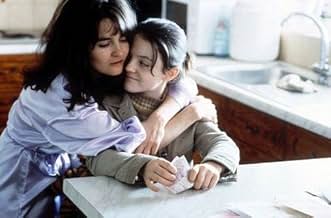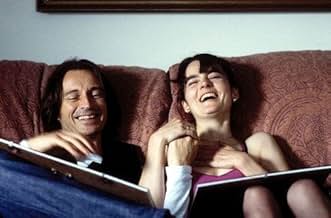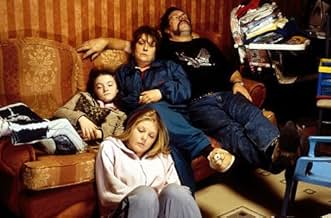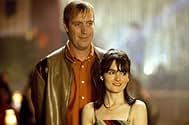IMDb RATING
6.1/10
4.9K
YOUR RATING
After seeing his ex-girlfriend (Henderson) turn down a nationally televised marriage proposal, a small-time crook (Carlyle) returns to his hometown to try and win back her heart.After seeing his ex-girlfriend (Henderson) turn down a nationally televised marriage proposal, a small-time crook (Carlyle) returns to his hometown to try and win back her heart.After seeing his ex-girlfriend (Henderson) turn down a nationally televised marriage proposal, a small-time crook (Carlyle) returns to his hometown to try and win back her heart.
- Awards
- 3 nominations total
David McKay
- Dougy
- (as David Mckay)
- Director
- Writers
- All cast & crew
- Production, box office & more at IMDbPro
Featured reviews
Firstly, let me say how much I like Shane Meadow's work (particularly 'A Room For Romeo Brass'). However 'Once Upon a Time in The Midlands' is, in my opinion, his weakest work to date. That's not to say it isn't a good film, it is, but somewhere along the line the Meadow's formula went wrong. It smacks of too much development, something Meadows complained about himself, almost as if Film Four wanted to bottle the distinctive spirit of his earlier work, mass produce it and sell it to the widest audience possible. The characters end up as caricatures and whereas previous Meadows films examined the wonderful humanity and quiet dignity inherent in everyday life this one ends up in danger of being patronising to its subjects. The title and tag line are great but I wonder if they weren't thought up before the actual story and at the expense of the film. I personally found the Western elements a little superfluous, the deluge of famous faces distracting (what on Earth are Reeves and Mortimer doing as clowns?!), and the Glasgow gangsters subplot unnecessary. Once these elements fall by the wayside however, as they do in the second half, the film settles down into telling a decent little story. The central love triangle comes to the fore and we actually begin to connect with the characters. All the performances are good but special mention must go to young Finn Atkins who is outstanding. If this is your first taste of Meadows then don't be put off, just know that there are better films in his back catelogue than this. The 2 disc DVD is worth investing in though as the extras include Shane's World and a really nice documentary on the film's promotional tour.
I generally like Shane Meadows, his honest writing and depiction of what early 21st century average life in Britain is actually like, is both appealing and refreshing.
This one (I re-watched after many years and seen all his later work) is just a bit of a tangled mess (hence my summary title). It was great to watch the great Kathy Burke in a dominant (yes!) role now that she's concentrating on theatre direction these days. Also, her screen hubbie, a rather ridiculous wannabe country singer in the shape of Ricky Tomlinson.
Robert Carlyle plays to form as a real piece of ***t who is after getting his ex back. I soon found his constant shouting, swearing and nastiness wearying and Ryhs Ifans' counter example, as poor Shirley Henderson's dopey, lily-livered 'boyfriend' equally annoying. I wanted to shout out loud 'forget them both', but this being drama, the opposite happens of course.
The lighter moments, I suppose were intended to punctuate this domestic misery with an air of humanity. But, most of the time, they look stupidly careless, leaving you unsure whether they were intentional, or not. I did like the overall premise, especially at the end, when the subversive comparison to the classic western becomes apparent, though the setting is a modern English city's housing estate over a hundred years later. The Sierra Cosworth being the equivalent of a wild stallion...?
Meadow's work, though, is always of much merit and the fact that he has gotten himself a niche and etched himself a position on that elite panel of independent Brit directors whose work is admired equally by critics and public alike, is to be much admired. It also means that this quite early offering from him is still above average.
This one (I re-watched after many years and seen all his later work) is just a bit of a tangled mess (hence my summary title). It was great to watch the great Kathy Burke in a dominant (yes!) role now that she's concentrating on theatre direction these days. Also, her screen hubbie, a rather ridiculous wannabe country singer in the shape of Ricky Tomlinson.
Robert Carlyle plays to form as a real piece of ***t who is after getting his ex back. I soon found his constant shouting, swearing and nastiness wearying and Ryhs Ifans' counter example, as poor Shirley Henderson's dopey, lily-livered 'boyfriend' equally annoying. I wanted to shout out loud 'forget them both', but this being drama, the opposite happens of course.
The lighter moments, I suppose were intended to punctuate this domestic misery with an air of humanity. But, most of the time, they look stupidly careless, leaving you unsure whether they were intentional, or not. I did like the overall premise, especially at the end, when the subversive comparison to the classic western becomes apparent, though the setting is a modern English city's housing estate over a hundred years later. The Sierra Cosworth being the equivalent of a wild stallion...?
Meadow's work, though, is always of much merit and the fact that he has gotten himself a niche and etched himself a position on that elite panel of independent Brit directors whose work is admired equally by critics and public alike, is to be much admired. It also means that this quite early offering from him is still above average.
Shane Meadows' first film, 'TwentyFour Seven', was dark, intense and arty; his second, 'A Room for Romeo Brass', is one my favourite movies, atmospheric, wildly funny and moving. But this, his third film, is not quite as brilliant, and indeed Meadows has acknowledged it as something of a wrong turn. Compared to it's predecessors, the mood is less claustrophobic, the humour a bit broader brush, and ultimately the movie is less poignant. Perhaps part of the problem is that whereas one of the highlights of Meadows' earlier films were the brilliant performances he coaxed out of largely unknown actors (Bob Hoskins was just about the only name of note in them), this film features a regular gallery of Brit-acting talent: Robert Carlyle, Kathy Burke, Ricky Tomslinson and Rhys Ifans. And while I have enjoyed movies featuring all of these actors, it's a bit hard, especially in the case of Tomlinson, to really see them in their roles, as opposed to as themselves. Sometimes, they almost seem to be performing too hard to fit into Meadows' sparsely filmed backdrops. One can also note that the cod-western theme is pursued with insufficient vigour to really define the movie. I don't want to be too harsh on the film overall, because there are still some very funny moments and excellent acting from Shirley Henderson and the young Finn Atkins. But it's certainly less ambitious than its two predecessors, which set the highest of standards by which to judge their successors.
Respect is definitely due to Mr Meadows. He has made films about Britain that qualify as top notch cinema. He is a true artist - he portrays conflict both within and between people with his own style and bizarreness. He is making films about the people that fill British streets but do not on the whole have their own biographical art. His insistent use of everyday public and private space (the yellow brick semi, the grubby flat, the suburban street, the dilapidated bunch of in-town shops) gives his films a hyper-realistic, hallucinatory quality, like memories of childhood made flesh again.
The kaleidoscope of humour that dazzles the viewer of `A Room For Romeo Brass' or the first half of `Once upon a time.' is a gorgeous normality - a concentrated sniff of the glue that keeps working people and families together. These films know that this humour is an art form - akin to any other kind of oral culture through history, its purpose is to give its user's lives meaning, be it while fighting predators, invaders or the daily grind.
Meadows' plots are more overtly psycho-political than socio-political: the evil and darkness in his film comes from the past, from childhood. The families affected by that darkness tend to be the source of light and laughter which combats the darkness. Parents on-screen are loving and nurturing - it is orphans, or offspring of violent parents that bring this darkness from their off-screen histories to the films. This is where the dramatic power comes from - when Morrel in `Romeo Brass' alludes enigmatically to his violent father, our imaginations are left to their own devices. Similarly, though with less dramatic import, we are informed briefly in `once upon a time' that Jimmy is Carol's foster brother, and again we get that sense of how a fractured childhood creates a damaged adult.
Unfortunately Meadows cannot keep the dramatic quality up in `once upon a time' in the same way that he did to such devastating effect in `24-7' and `Romeo Brass'. The cowboy conceit that is one of the strands of amusement and pleasure in the film's first half gets strangely discarded just as it might be most effective - when Dek the cowardly geek finds his manhood. It is replaced by a strangely witless and conformist soap opera seriousness as the two dads tussle for one family. The surrealist streaks are still there (for instance Jimmy's penchant for haircuts, which I'm sure says a lot about his character) but the overall feel is that Meadows and his co-writer Paul Fraser repressed what had previously made the characters interesting in a kind of commercial dumbing-down attempt. `If Eastenders can get 19 million people watching it 3 times a week', they seem to have reasoned, `Then surely we can get some of that Ganesh magic to rub off on us'.
In the light of public indifference to Meadows' previous two glorious films, though, you have to be sympathetic to this. And it's worth watching for the first two thirds, some lovely acting (particularly by Rhys Ifans) and a kind of existential glow that I seem to get from Meadows' films and which makes him a top director in my book.
The kaleidoscope of humour that dazzles the viewer of `A Room For Romeo Brass' or the first half of `Once upon a time.' is a gorgeous normality - a concentrated sniff of the glue that keeps working people and families together. These films know that this humour is an art form - akin to any other kind of oral culture through history, its purpose is to give its user's lives meaning, be it while fighting predators, invaders or the daily grind.
Meadows' plots are more overtly psycho-political than socio-political: the evil and darkness in his film comes from the past, from childhood. The families affected by that darkness tend to be the source of light and laughter which combats the darkness. Parents on-screen are loving and nurturing - it is orphans, or offspring of violent parents that bring this darkness from their off-screen histories to the films. This is where the dramatic power comes from - when Morrel in `Romeo Brass' alludes enigmatically to his violent father, our imaginations are left to their own devices. Similarly, though with less dramatic import, we are informed briefly in `once upon a time' that Jimmy is Carol's foster brother, and again we get that sense of how a fractured childhood creates a damaged adult.
Unfortunately Meadows cannot keep the dramatic quality up in `once upon a time' in the same way that he did to such devastating effect in `24-7' and `Romeo Brass'. The cowboy conceit that is one of the strands of amusement and pleasure in the film's first half gets strangely discarded just as it might be most effective - when Dek the cowardly geek finds his manhood. It is replaced by a strangely witless and conformist soap opera seriousness as the two dads tussle for one family. The surrealist streaks are still there (for instance Jimmy's penchant for haircuts, which I'm sure says a lot about his character) but the overall feel is that Meadows and his co-writer Paul Fraser repressed what had previously made the characters interesting in a kind of commercial dumbing-down attempt. `If Eastenders can get 19 million people watching it 3 times a week', they seem to have reasoned, `Then surely we can get some of that Ganesh magic to rub off on us'.
In the light of public indifference to Meadows' previous two glorious films, though, you have to be sympathetic to this. And it's worth watching for the first two thirds, some lovely acting (particularly by Rhys Ifans) and a kind of existential glow that I seem to get from Meadows' films and which makes him a top director in my book.
Brilliantly observed comic scenes of working class domestic life, reminiscent of Caroline Aherne's superb 'Royle Family' sitcom, provide the backdrop for an engaging comedy-drama. All the main actors turn in typically excellent, albeit unsurprising performances: Robert Carlyle does a variation on his Scottish psycho-crim (see 'Trainspotting'), Ricky Tomlinson plays another genial but feckless Scouser (see 'The Royle Family') and Kathy Burke does her no-nonsense council-house Cockney routine (see Kathy Burke). By far the best of the ensemble is Rhys Ifans as Dek. Dek is the most rounded of the comic characters, all of whom are neatly sketched out, not just by dialogue, but by carefully chosen background details. Look out for the hub caps and model car collection in Dek's house and the cases of 'Pot Noodle' in Charlie's loo (which also serves as his office). Assured direction, a well-paced script and some very funny jokes make for a satisfying if somewhat predictable watch.
Did you know
- TriviaDek (Rhys Ifans) drives a car with a vintage Welsh number plate from the late fifties, the letters of which read "DEK". It was issued in Haverfordwest, the birthplace of Rhys Ifans.
- Crazy creditsSpecial thanks to ... the People of Carlton and Gedling, Nottingham ...
- SoundtracksFeels Like I'm in Love
Written by Ray Dorset
Published by Sony/ATV Music Publishing, Ltd. / Associated Music International, Ltd.
Performed by Kelly Marie
Courtesy of Eliot Cohen (as Eliot M. Cohen) of Satellite Music, Ltd.
- How long is Once Upon a Time in the Midlands?Powered by Alexa
Details
- Release date
- Countries of origin
- Official site
- Language
- Also known as
- Érase una vez en los Midlands
- Filming locations
- Production companies
- See more company credits at IMDbPro
Box office
- Budget
- £1,950,000 (estimated)
- Gross US & Canada
- $172,564
- Opening weekend US & Canada
- $21,475
- Aug 31, 2003
- Gross worldwide
- $544,512
- Runtime
- 1h 44m(104 min)
- Color
- Sound mix
- Aspect ratio
- 2.35 : 1
Contribute to this page
Suggest an edit or add missing content







